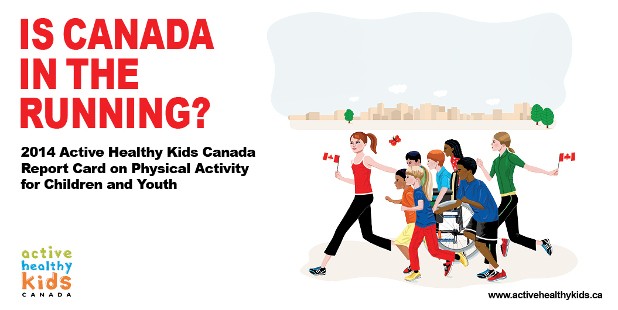OTTAWA (ONTARIO) MAY 20, 2014 – The Healthy Active Living and Obesity Research Group (HALO) supports the 2014 Report Card on Physical Activity for Children and Youth, released today by Active Healthy Kids Canada and its strategic partners, ParticipACTION and the Children’s Hospital of Eastern Ontario (CHEO) Research Institute – HALO.
For the first time, the Active Healthy Kids Canada Report Card looked at how Canadian child and youth physical activity stacks up against 14 other countries and reveals Canada is among the top countries for having well-developed physical activity infrastructure and programs, but trails at the back of the global pack for overall physical activity levels. In Canada, we have successfully built sophisticated infrastructure and programs to support kids’ activity, but this alone is not enough to add up to an active population. The global comparisons highlight a need in Canada to examine our own culture of convenience.
“Our society values efficiency—we build more, do more and impose more structure—but perhaps this approach is somewhat misguided when it comes to getting kids more active,” says Dr. Mark Tremblay, Chief Scientific Officer, Active Healthy Kids Canada. “A child’s day is so structured that there is no room for free play or walking or biking to school. Having plenty of local playgrounds is important, but what if they never get used? To increase daily physical activity levels for all kids, we must encourage a mix of opportunities, such as organized sport, active play and active transportation.”
“Overall, child and youth physical activity levels remain alarmingly low—the Report Card tells us that only five per cent of five- to 17-year-olds are meeting the Canadian Physical Activity Guidelines,” says Elio Antunes, President and CEO, ParticipACTION. “That’s why we need to encourage a wider variety of opportunities to improve the grade on kids’ physical activity levels, and in some cases we need to step back and do less. Many parents see active transportation and active play as inconvenient or unsafe, which results in kids spending their free time indoors being sedentary. In fact, these are great, cost-efficient ways to get kids moving more.”
New Zealand and Mozambique lead the pack with “B” grades in Overall Physical Activity. The global comparisons reveal that New Zealand seems to have found success in providing a balance of opportunities for organized activities and active play, with most kids saying they spend an average of 78 minutes per day in free play. And, in Mozambique, where the majority of the population lives in rural environments, high physical activity levels consist largely of transport and domestic chores.
“Considered in a global context, Canada is a developed country, but it might be fair to say Canada is overdeveloped when it comes to its physical activity infrastructure and programs for children and youth,” says Jennifer Cowie Bonne, CEO, Active Healthy Kids Canada. “Canada will never reap the benefits of our well-developed policies, programs and places unless we relax our grasp and give our kids room to move. Parents and families, policymakers, schools and community leaders must work together to make it easier for our kids to make the active choice, more often.”
More on the global comparisons
For its 10th anniversary Report Card on Physical Activity for Children and Youth, Active Healthy Kids Canada brought research teams from 15 countries across five continents together to establish and compare grades, and seek solutions to the worldwide childhood inactivity crisis. Countries that participated in the international comparison process, based on the Active Healthy Kids Canada Report Card framework, included: Australia, Canada, Colombia, England, Finland, Ghana, Ireland, Kenya, Mexico, Mozambique, New Zealand, Nigeria, Scotland, South Africa and the United States. The results of the global comparisons and Canada’s Report Card were shared with 700 international delegates at the first-ever Global Summit on the Physical Activity of Children, hosted by Active Healthy Kids Canada on May 19 to 22 in Toronto.
Among the ten grades assigned to Canada, key grades and comparisons include:
- “D-” for Overall Physical Activity – Mozambique and New Zealand lead with a B, and Scotland lags with an F.
- “C+” in Organized Sport Participation – New Zealand leads with a B and Mozambique lags with an F.
- “B+” in Community & the Built Environment – Australia leads with an A-, and Mexico and Mozambique lag with an F.
- “D” in Active Transportation – Finland, Kenya, Mozambique and Nigeria lead with a B, and United States lags with an F.
- “F” in Sedentary Behaviours – Ghana and Kenya lead with a B, and Scotland, South Africa and Nigeria also received an F.
- “C+” in School – England leads with an A- and Colombia lags with an F.
Full copies of the short-form and long-form Report Card, plus free presentations, articles and media materials can be found at www.activehealthykids.ca.
-30-
For more information or copies of the Report Card, or to schedule an interview, please contact:
Meaghan Beech
Hill+Knowlton Strategies
W: 416-413-4650
M: 647.463.4467
meaghan.beech@hkstrategies.ca
Katherine Janson
ParticipACTION
W: 416-913-1471
M: 647.717.8674
kjanson@participACTION.com


